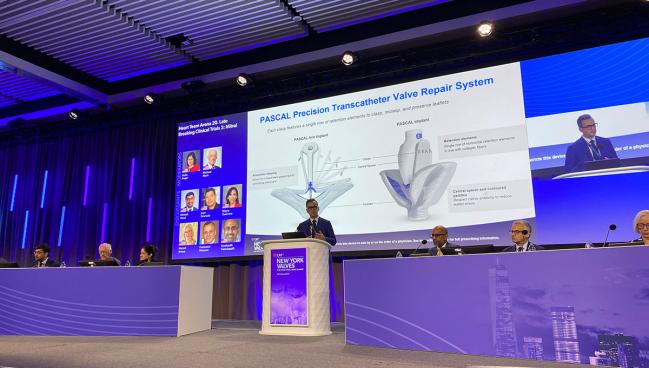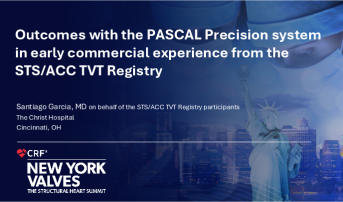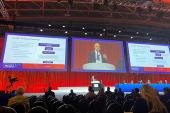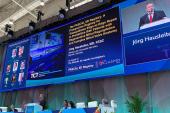Good Outcomes, Little Hospital Experience: Pascal TEER in Real World
The study led to questions about whether patients would be best served by being treated at high-volume centers of excellence.

NEW YORK, NY—Transcatheter edge-to-edge repair (TEER) with the Pascal system (Edwards Lifesciences) in patients with degenerative mitral regurgitation (MR) results in good early survival outcomes, significant reductions in MR, and improvements in quality of life, according to an analysis of the STS/ACC TVT Registry.
Santiago Garcia, MD (The Christ Hospital, Cincinnati, OH), who presented the findings Friday at New York Valves 2025, said the “first US commercial experience reinforces the early safety and effectiveness of the novel Pascal Precision system in the treatment of a broad population of [degenerative] MR patients in a real-world setting.”
The new analysis is based on 1,995 patients (mean age 81.6 years; 57% male) with degenerative MR who underwent M-TEER with the Pascal device at 181 US sites between September 2022 and October 2024. The majority of centers (n = 120) did fewer than 10 procedures over the 2-year study period, with 40 reporting between 10 and 25, 16 logging between 25 and 50, and only five completing more than 50 procedures.
Anita Asgar, MD (Montreal Heart Institute, Canada), who co-chaired the session, told TCTMD the study is “very encouraging for TEER in general. I think it’s great for the future of the device in the sense that you’ve shown people who don’t have a lot of experience can still safely use the technology and get a good result.”
Increasing procedural volumes will be a challenge going forward, she added.
“As a community, if we really want to focus on getting excellent TEER outcomes for patients, we have to accept the fact that we have to be invested in the procedure and focus and really put the effort into getting the volume and getting the experience,” Asgar said. “This shows us that whatever device we use, we need a good result. The key is really for us to be committed to the procedure and the technology and really just do enough volume to be good at it.”
Commercial Experience
The US Food and Drug administration first approved Pascal in 2022 following positive results from the CLASP IID randomized trial comparing the device to MitraClip (Abbott) in patients with degenerative MR. It is not yet approved in patients with functional MR, although the device is being compared against MitraClip in the ongoing CLASP IIF study.
Over the 2-year study period, most patients in the registry were treated with the narrower Pascal Ace implant either alone (69.9%) or in combination with the original, wider device (9.7%); the remainder received the first-iteration Pascal device alone.
Mean procedure duration was 94 minutes, 7.5% of patients had a concomitant procedure, and device implantation was successful in 97.7%. Almost two-thirds of patients received a single device, 32.7% received two, and 2.6% needed three devices. Only 0.1% of cases required conversion to open-heart surgery and 1.2% needed mechanical support.
All-cause and cardiovascular mortality rates at 30 days were 2.2% and 1.2%, respectively. Stroke was reported in 1.4% of cases, readmission for heart failure in 2.6%, mitral valve reintervention in 0.4%, and MI in 0.2%.
There were significant improvements in MR, with 94.2% and 72.6% of patients categorized as MR 2+ or 1+, respectively, at 30 days (P < 0.001 compared with baseline). Additionally, mitral valve gradient doubled from 2.0 mm Hg at baseline to 4.0 mm Hg at 30 days.
Quality of life as measured by both NYHA class and Kansas City Cardiomyopathy Questionnaire (KCCQ) score improved significantly (P < 0.001 for both): 84.6% of patients were categorized as NYHA class I or II at 30 days and mean KCCQ score improved from 51.6 to 72.6 points.
In a subanalysis focused on the 66.9% of patients with complex anatomy, outcomes were largely the same, say researchers.
Work Remains
Nimesh Desai, MD, PhD (Penn Medicine, Philadelphia, PA), the discussant following the presentation, called the findings “impressive,” adding that it “continues to show the incredible safety of TEER in patients with degenerative MR.” Additionally, he continued, it “highlights the use of the 14-year-old TVT Registry, which has become the gold standard for postmarket surveillance of these technologies throughout the world.”
The commercial success with Pascal also points to the lack of a major learning curve, given the limited experience noted in the majority of centers in the study, Desai said.
With about one in five patients showing moderate or greater MR at 30 days, however, there remains work to be done, said panelist Francesco Maisano, MD (San Raffaele Hospital, Milan, Italy). “This technology has been democratizing valve repair, but democratizing doesn’t mean that every patient gets a real good outcome,” he said. Mitral TEER is “learnable, . . . but it requires dedication and time,” he said.
Given that so few require an emergency procedure, Maisano believes the majority of patients with degenerative MR should be referred to high-volume centers.
Asgar agreed, but said the trade-off is not being able to deliver care to patients near where they live.
“Are we actually doing [patients] a disservice by not doing enough of these cases and not giving them the result they need?” she asked. “Somewhere in the middle is going to be the answer. It’s never at the extremes. We, as a community, have to really focus on delivering care in proximity to patients, but also the highest-quality care.”
The highest-quality care is not going to be found at centers doing five procedures, said Asgar.
Panelist Mariell Jessup, MD, chief science and medical officer of the American Heart Association, also emphasized the importance of postprocedural medical therapy in these patients.
“We need to make sure that there’s medical therapy being used optimally after the intervention,” she said. “If that information is in the TVT Registry, then it needs to be reported because you as an interventionalist need to say: ‘Don’t just rely on the valve. You need medical therapy.’”
Yael L. Maxwell is Senior Medical Journalist for TCTMD and Section Editor of TCTMD's Fellows Forum. She served as the inaugural…
Read Full BioSources
Garcia S. Outcomes with the PASCAL Precision system in early commercial experience from the STS/ACC TVT registry. Presented at: New York Valves 2025. June 27, 2025. New York, NY.
Disclosures
- Garcia reports receiving consultant fees/honoraria from Edwards Lifesciences, Medtronic, Abbott Vascular, Boston Scientific, Anteris, Capstan Medical, and B. Braun; serving as a proctor for Edwards Lifesciences and Abbott Vascular; holding stock in Capstan Medical; and serving on the advisory board for Medtronic, Capstan Medical, and Boston Scientific.
- Desai reports receiving grant/research support from WL Gore, Edwards Lifesciences, and Medtronic and consultant fee/honoraria/speaker’s bureau for WL Gore, Edwards Lifesciences, Medtronic, and Terumo.
- Jessup and Maisano report no relevant conflicts of interest.






Comments